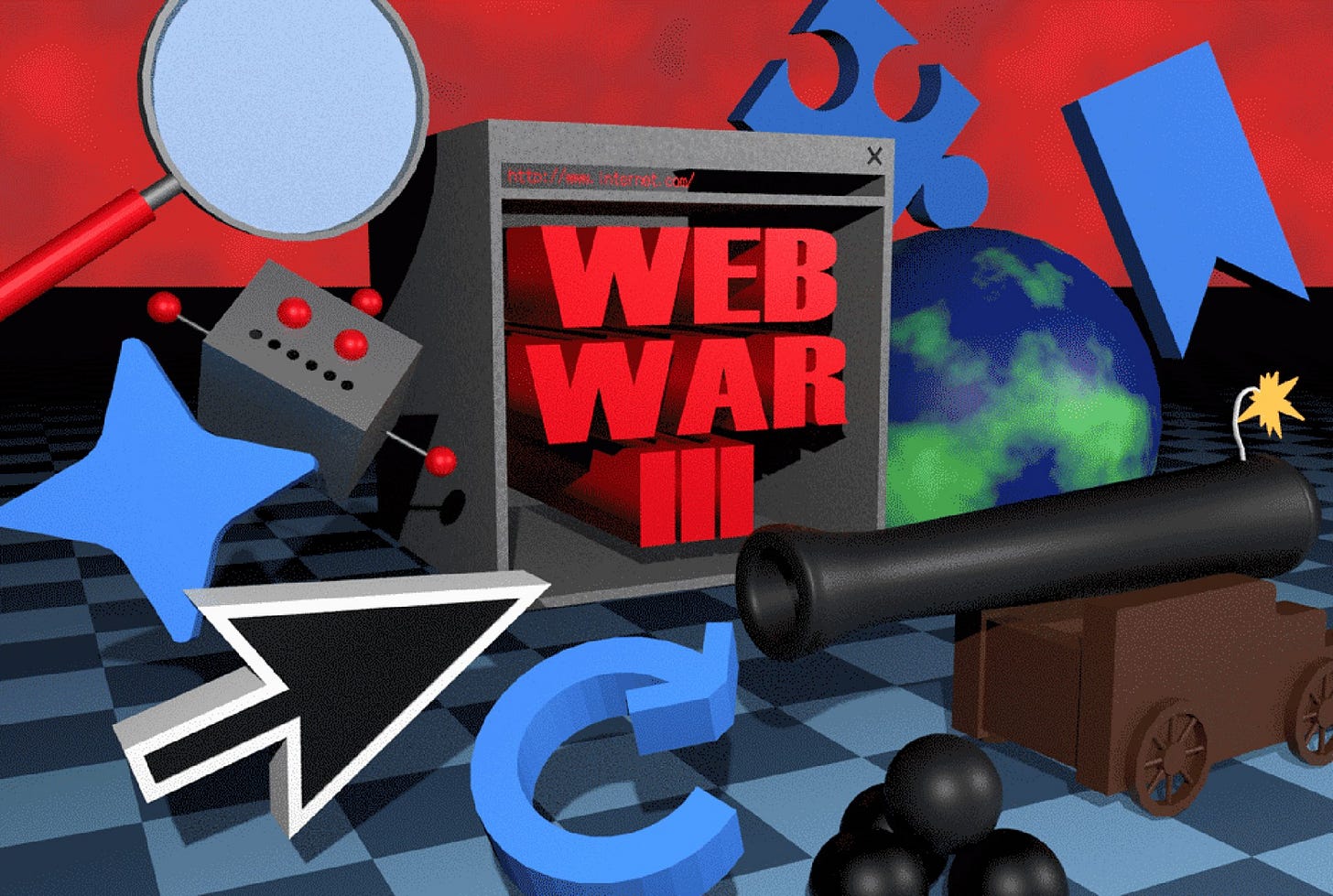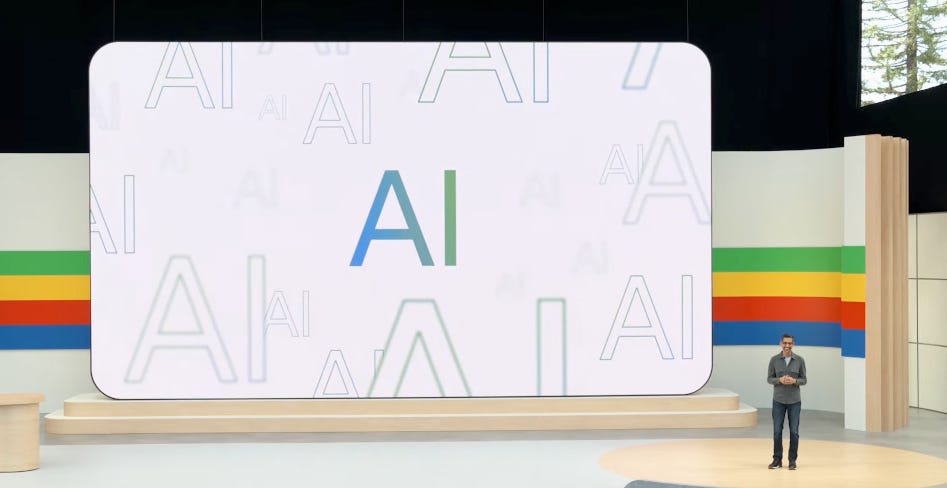A week in Generative AI: Web War III, Coca-Cola & Defamation
News for the week ending 9th November 2025
It’s been a quiet news week this week on the AI front, which is a bit of a welcome break and gives us the opportunity to dive into a few other areas in more detail.
First up we have a fantastic article from The Verge on what they’re calling Web War III and the battle for the most important text box on your computer. This week also saw Coca-Cola back with an AI-generated Christmas ad, which just like last year hasn’t gone down well with consumer, or the wider marketing industry. And lastly, we have a US senator forcing Google to remove their Gemma model as it was hallucinating some pretty defamatory things about him.
There are some good Web 4.0 stats too with Shopify claiming that AI-driven orders are up 11x YoY and some research that shows that Google’s AI Overviews have created a 61% drop in organic traffic and an even bigger drop of 68% in traffic from paid advertising.
There’s also a great Long Read from Stratechery on the current AI Bubble and why it might actually be a good thing.
Enjoy!
Web War III and the most important text box on your computer
There was a great article this week from The Verge on what they’re calling Web War III, which had the best one-paragraph description I’ve read on what ‘zero-click’ browsing is and why AI companies are so interested in it:
If Browser War I was about webpages, and BWII was about web apps, BWIII could be about web agents. The AI companies all believe we’re about to spend less time typing URLs and more asking chatbots to do things on our behalf. If any of that is ever going to work, you’re going to need an AI assistant that has access to all of your information and every app and service required to help you out. The web is the only place all that exists, and the browser’s the simplest way to get access to all of it.
As long-time readers know, I’ve been writing and talking a lot about Web 4.0 this year, and ‘zero-click’ browsing is one of it’s three pillars (alongside ‘zero-click’ search and purchasing). This article from The Verge is well worth checking out if you want to learn more and understand where this whole area could be heading.
Coca-Cola’s new AI holiday ad is a sloppy eyesore
It’s almost 12 months to the day when I wrote about Coca-Cola’s badly judged AI remake of one of their iconic Christmas ads last year, and now they’ve at it again!
Coca-Cola wouldn’t comment on the exact cost of making this new AI-generated eyesore, although they did say it was cheaper and speedier to produce (1 month vs. 1 year). They also confirmed that 100 people were involved in its creation (in line with their non-AI ads) and that they refined 70,000 (?!) video clips to make it. I hate to think of the environmental cost of generating that many video clips.
This is exactly what’s wrong with how many marketers and advertising agencies are approaching generative AI - they want to make the art of advertising cheaper and speedier without any consideration to the quality of the output. They’re also obsessed with efficiency and pay no consideration to how we can use AI to make our work better.
It turns out I didn’t have to think about the environmental cost as I could get ChatGPT to do that thinking for me. It helped me estimate that generating 70,000 10 second clips to produce this ad would have emitted between 9 and 15 tonnes of CO₂. I’m sure no actual animals were harmed during the making of this ad, but this is the same amount of carbon produced every year by c.100 of the cute fluffy penguins featured in the ad.
Google pulls Gemma from AI Studio after Senator Blackburn accuses model of defamation
I think we’re going to see a lot more cases like this as the generative AI space matures. There are two problems here: models can hallucinate false claims, and they can reproduce bad information from their training data. Either way, the outcome is the same: misinformation that spreads.
It’s important to note that Google had to pull Gemma from their AI Studio to address this. There isn’t currently a simple, surgical way to update what’s embedded in a trained model or to reliably stop it hallucinating at scale.
This gets even trickier in Europe. Under GDPR, individuals have rights to rectification and erasure, but there’s currently no straightforward way to enforce those rights against a deployed model, without pulling it entirely. It’s only a matter of time before we see legal cases that reshape both how models are trained and how the regulations are applied.
Web 4.0
Shopify says AI traffic is up 7x since January, AI-driven orders are up 11x
Google AI Overviews drive 61% drop in organic CTR, 68% in paid
Google’s AI Mode gets new agentic capabilities to help book event tickets and beauty appointments
AI Ethics News
EU could water down AI Act amid pressure from Trump and big tech
Altman and Nadella need more power for AI, but they’re not sure how much
Stability AI’s legal win over Getty leaves copyright law in limbo
Studio Ghibli, Bandai Namco, Square Enix demand OpenAI stop using their content to train AI
Amazon sends legal threats to Perplexity over agentic browsing
xAI used employee biometric data to train Elon Musk’s AI girlfriend
Experts find flaws in hundreds of tests that check AI safety and effectiveness
ChatGPT accused of acting as ‘suicide coach’ in series of US lawsuits
Microsoft AI Chief Warns Pursuing Machine Consciousness Is a Gigantic Waste of Time
Long Reads
Stratechery - The Benefits of Bubbles
Windows on Theory - Thoughts by a non-economist on AI and economics
Wired - AI of a Thousand Faces
The Verge - I let Gemini watch my family for the weekend — it got weird
“The future is already here, it’s just not evenly distributed.“
William Gibson





